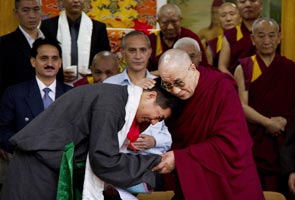
A Tibetan Buddhist monk protesting Chinese policies immolated himself publicly in a Tibetan area of Sichuan Province in southwest
China on Monday, an outside advocacy group reported. It was the second such act in the area in the past five months and appeared to reflect resistance to increased Chinese repression of loyalty to
Tibet’s exiled spiritual leader, the Dalai Lama.
The monk was heard calling, “We Tibetan people want freedom,” “Long live the Dalai Lama” and “Let the Dalai Lama return to Tibet,” after he drank gasoline, doused himself with it and set himself alight on a bridge in the center of Daofu, a town in Ganzi County in Sichuan, according to the advocacy group
Free Tibet. The group is based in London, but has a network of contacts in Tibet and Tibetan-populated areas elsewhere in China.
Xinhua, China’s official news agency, reported the death of a monk in Daofu, but did not provide details.
Ganzi, known in Tibetan as Kardze, is overwhelmingly populated by ethnic Tibetans. It has been an area of chronic tensions for the Chinese authorities, most related to the country’s Han ethnic majority.
China’s government regards the vast Himalayan region of Tibet as an integral part of China and is sensitive to expressions of support for the Dalai Lama, who fled into exile in 1959 and who has accused China of stifling Tibetan culture. The Chinese consider the Dalai Lama a subversive advocate of Tibetan independence, although he has said he only wants greater autonomy for Tibet.
Stephanie Brigden, the director of Free Tibet, identified the monk who killed himself as Tsewang Norbu, 29. She said he was protesting what she described as the harsh treatment of Tibetans following the
March 16 immolation by a monk from the Kirti monastery in Aba, or Ngaba in Tibetan, in the same region of Sichuan. She said the repression worsened further when Tibetans in Daofu and elsewhere defied a government ban on celebrating the Dalai Lama’s 76th birthday on July 6.
“We’ve basically seen an escalation in the clamping down,” she said in a telephone interview. “It is not just limited to this area.”
In a news release, Ms. Brigden said her group had “grave concerns” about what could happen in Daofu in the aftermath of the monk’s immolation, and at his monastery, Nyitso. She said that telephone and Internet access had been cut and that the group had “received reports that the army has surrounded the monastery.”
The resilient support for the Dalai Lama among China’s five million Tibetans has taken on increased significance with time. The Dalai Lama has said he may choose his own successor, deviating from the practice in which senior lamas identify each Dalai Lama’s reincarnation after his death. In response, Chinese authorities in Beijing have said they have the authority to name the next Dalai Lama. They have been seeking to promote their own handpicked successor, the Panchen Lama, second only to the Dalai Lama in the Tibetan Buddhist hierarchy.
The so-called Chinese Panchen Lama, who has spent most of his life in Beijing, went on a
politically significant trip last week to a town that is home to a cherished monastery in a Tibetan-populated area of Gansu Province, where he was expected to study and meditate for weeks. Experts on Tibet said the trip appeared to have been part of the Chinese government’s attempt to give the Panchen Lama more legitimacy among monks and other Tibetans by broadening his exposure outside the capital.
Source Credit: NYTimes





